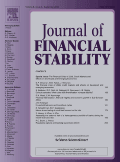
Journal of Financial Stability
Scope & Guideline
Connecting scholars to the forefront of financial innovation.
Introduction
Aims and Scopes
- Banking and Financial Regulation:
The journal focuses on the effects of regulatory changes and banking policies on financial stability, including capital requirements, liquidity management, and risk assessment frameworks. - Macroeconomic Stability and Financial Systems:
Research often examines the interplay between macroeconomic indicators and financial stability, exploring how economic conditions influence banking operations and systemic risk. - Risk Management and Financial Contagion:
A significant area of interest is the study of risk management practices within banks and financial institutions, including the dynamics of contagion in interconnected financial networks. - Impact of Technology and Innovation:
The journal highlights the role of fintech, digital currencies, and technological advancements in reshaping financial markets and their potential risks and benefits. - Climate Change and Sustainability in Finance:
There is a growing emphasis on the implications of climate risks for financial stability, exploring how environmental factors affect lending practices and asset valuations.
Trending and Emerging
- Climate Risk and Financial Stability:
There is a notable increase in research addressing the intersection of climate change and financial stability, focusing on how environmental risks impact banking operations and long-term sustainability. - Digital Currencies and Fintech Innovations:
The rise of central bank digital currencies (CBDCs) and fintech solutions has become a prominent theme, with research exploring their implications for traditional banking and regulatory frameworks. - Macroeconomic Policy and Financial Interventions:
The impact of macroeconomic policies, particularly in the wake of the COVID-19 pandemic, has gained traction, emphasizing the role of government interventions in stabilizing financial institutions. - Systemic Risk and Interconnectedness:
Emerging studies are increasingly examining systemic risk through the lens of interconnected financial systems, focusing on how shocks can propagate across banks and markets.
Declining or Waning
- Traditional Banking Models:
As the focus shifts towards fintech and digital innovations, traditional banking models and their analysis appear less frequently, indicating a waning interest in conventional banking practices. - Sovereign Debt Issues:
Research specifically targeting sovereign debt crises and their immediate impacts on banking stability has decreased, possibly overshadowed by more complex interdependencies and systemic risk analyses. - Behavioral Finance in Banking:
The exploration of behavioral finance aspects within banking contexts has become less prevalent, as empirical studies lean more towards quantitative approaches and systemic risk assessments.
Similar Journals
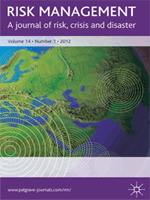
Risk Management-An International Journal
Pioneering Research in Risk and ResilienceRisk Management - An International Journal is a premier publication dedicated to advancing the understanding and methodologies of risk management across various sectors, including business, finance, and economics. Published by Palgrave Macmillan Ltd in the United Kingdom, this journal not only maintains a robust presence in the scholarly community but also ranks in the Q2 category for Business and International Management and Finance, as well as Q3 for Economics and Econometrics and Strategy and Management. With its diverse scope and commitment to high-quality research, the journal provides essential insights for academics, practitioners, and students alike, helping to shape the future of risk management practices globally. While not an open-access journal, its rigorous peer-review process ensures that only the most impactful and relevant studies are featured. Covering topics that converge the years from 2006 to 2024, Risk Management represents a vital resource for those looking to deepen their knowledge in this critical field.

JOURNAL OF FINANCIAL ECONOMICS
Connecting theory and practice in the world of finance.Welcome to the JOURNAL OF FINANCIAL ECONOMICS, a premier publication in the realms of finance, economics, and accounting, published by Elsevier Science SA in the Netherlands. With its impactful contributions since 1974, this esteemed journal has earned an impressive impact factor and consistently ranks in the Q1 category across various fields, including Accounting, Economics and Econometrics, Finance, and Strategy and Management. Researchers can access cutting-edge studies that delve into both theoretical frameworks and empirical analyses, crucial for advancing financial literacy and economic policies globally. With remarkable Scopus rankings, notably placing #2 in Accounting and #6 in Finance, the journal serves not only as a reliable resource for academics but also as a vital tool for professionals seeking to stay abreast of the latest financial trends and insights. Engage with the latest research and contribute to the dialogue shaping the future of financial economics!
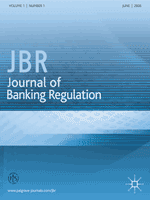
Journal of Banking Regulation
Decoding Complexities in Banking Regulations.Journal of Banking Regulation is a premier academic journal published by Palgrave Macmillan Ltd. based in the United Kingdom, contributing significantly to the fields of Economics and Finance. With an ISSN of 1745-6452 and an E-ISSN of 1750-2071, this journal serves as a vital platform for the dissemination of cutting-edge research that addresses the complexities of banking regulations in a rapidly evolving financial landscape. As a Q3 ranked journal in both Economics and Econometrics and Finance categories, it holds a respectable position among its peers, with Scopus ranks highlighting its impact within the research community (Rank #246/716 and #115/317, respectively). The journal has been converging contemporary studies and analyses since its inception in 2008, and actively invites scholars, professionals, and students to explore its insightful articles. Though primarily subscription-based, readers can benefit from its rigorous content, which aims to inform regulatory practices and foster a deeper understanding of the banking sector's intersection with global economic trends.

Journal of Central Banking Theory and Practice
Elevating Understanding of Central Banking DynamicsThe Journal of Central Banking Theory and Practice, published by SCIENDO, is a leading open-access journal that has been providing valuable insights into the realms of central banking, monetary policy, and financial stability since its inception in 2012. With its ISSN 1800-9581 and E-ISSN 2336-9205, this journal emphasizes rigorous scholarly research, catering to a wide audience of economists, finance professionals, and academic researchers. Based in Germany, the journal has established a strong reputation, evident from its improved category quartiles - moving from Q3 in Economics, Econometrics, and Finance to a commendable Q2 in 2023. With an impressive Scopus rank of #83/288 in General Economics and a 71st percentile ranking, it stands as a pivotal resource for understanding current trends and practices in central banking. Authors are encouraged to submit high-quality, original research that fosters knowledge and advances the field. This journal not only disseminates significant findings but also promotes discussions that are critical for policymakers and stakeholders in the financial sector.

Annual Review of Financial Economics
Illuminating the Interplay of Economic TheoriesAnnual Review of Financial Economics, published by Annual Reviews, stands as a pivotal journal in the fields of Economics and Finance, recognized for its rigorous analysis and comprehensive reviews since its inception in 2010. With an impressive impact factor reflected in its Q1 ranking in both Economics and Econometrics and Finance for 2023, this journal serves as an essential resource for researchers, professionals, and students keen on understanding the dynamic interplay of financial theories and practices. The ISSN 1941-1367 and E-ISSN 1941-1375 signal its commitment to accessibility and dissemination of cutting-edge research within the community. Addressing crucial topics from market behavior to economic modeling, each annual volume synthesizes the latest findings and theoretical advancements, thus contributing significantly to the global discourse within financial economics. With its high Scopus rankings, including a finance rank of #75 out of 317, the journal continues to foster a deep understanding of financial systems and their implications, serving as an invaluable tool for anyone engaged in the broader economic landscape.
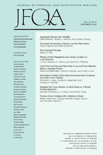
JOURNAL OF FINANCIAL AND QUANTITATIVE ANALYSIS
Illuminating Critical Issues in Financial AnalysisJOURNAL OF FINANCIAL AND QUANTITATIVE ANALYSIS, published by Cambridge University Press, is a premier peer-reviewed journal that has been at the forefront of the finance and economics fields since its inception in 1966. With a notable impact factor reflecting its Q1 status in Accounting, Economics and Econometrics, and Finance for 2023, the journal is recognized for its substantial contributions to both theoretical and empirical research. Researchers and practitioners alike benefit from its comprehensive scope, addressing critical issues in financial analysis and quantitative methods. Although the journal does not currently offer open access, it remains widely accessible through institutional subscriptions. The editorial team is committed to fostering rigorous academic discussions that shape the future of finance and economics, making it an essential resource for academics, students, and industry professionals seeking to deepen their understanding of these vital disciplines. For more than five decades, this journal has continued to be an indispensable platform for disseminating influential research, thus solidifying its role as an essential cornerstone in the financial and quantitative analysis community.
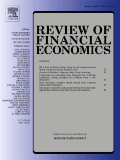
Review of Financial Economics
Unraveling Complexities in Financial EconomicsReview of Financial Economics, published by WILEY, stands as a prominent peer-reviewed journal in the fields of economics and finance. Established in 1994, this journal provides a platform for rigorous research and thoughtful discourse, contributing to the advancement of knowledge in financial theory and its applications. With an HIndex indicative of its citation impact, it ranks in the Q3 quartile for both Economics and Econometrics, as well as Finance, based on the 2023 categorization, underscoring its role in the academic community. Although it does not currently offer Open Access, the journal remains accessible to a wide audience through institutional subscriptions. Researchers, professionals, and students are encouraged to engage with its insightful articles that address contemporary issues and advancements within financial economics, fostering a deeper understanding of the complex interplay between economic systems and financial markets.
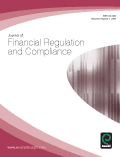
Journal of Financial Regulation and Compliance
Driving Discourse in Financial Management and ComplianceThe Journal of Financial Regulation and Compliance, published by Emerald Group Publishing Ltd, serves as a vital resource for researchers, professionals, and students in the fields of finance, strategy, and management. With an ISSN of 1358-1988 and E-ISSN 1740-0279, this esteemed journal has been at the forefront of scholarly dialogue since its inception in 1996, and it will continue to publish until 2024. As a recognized entity in the academic community, it holds a Q3 category ranking in both Finance and Strategy and Management according to the 2023 metrics. The journal is indexed in Scopus, with a respectable rank of #278 out of 478 in its category, placing it in the 41st percentile, further underscoring its contribution to relevant academic discourse. Although it does not currently offer Open Access, it produces high-quality, peer-reviewed content that addresses the latest developments and challenges in financial regulation and compliance. This journal is essential for anyone looking to engage with contemporary issues and theories shaping the financial landscape.
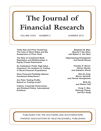
JOURNAL OF FINANCIAL RESEARCH
Transforming Financial Understanding Through ResearchThe JOURNAL OF FINANCIAL RESEARCH, published by WILEY, stands as a pivotal platform for disseminating innovative research in the fields of finance and accounting since its inception in 1978. With an ISSN of 0270-2592 and an E-ISSN of 1475-6803, this journal aims to address contemporary challenges and trends within the financial research landscape. It has achieved notable recognition, being placed in the Q2 category for both Finance and Accounting in the 2023 rankings, signifying its relevance and impact within the academic community. Although it does not currently offer open access, the journal is accessible through various academic databases, catering to a diverse audience of researchers, professionals, and students keen on advancing their knowledge and understanding of financial systems and methodologies. With an evolving scope that encompasses empirical studies, theoretical frameworks, and practical applications, the JOURNAL OF FINANCIAL RESEARCH is committed to contributing valuable insights into the complexities of financial practices and policies.

Pacific-Basin Finance Journal
Connecting Research and Practice in Pacific FinancePacific-Basin Finance Journal is a prestigious academic journal that focuses on critical developments and innovative research within the fields of finance and economics, specifically tailored to the Pacific region's unique economic landscape. Published by Elsevier, the journal boasts an impressive impact factor and is categorized in the Q1 quartile for both Economics and Econometrics and Finance as of 2023. This indicates its high relevance and position among the top journals in its field, with Scopus rankings reflecting a strong standing in the competitive landscape of finance research, holding the 45th position out of 317 in Finance and the 108th in Econometrics. Established in 1993, the journal is committed to disseminating rigorous theoretical and empirical research findings that enhance the understanding of financial systems in the Pacific Basin. Although the journal is not open access, it provides invaluable insights and comprehensive studies aimed at professionals, researchers, and students alike, fostering a deeper comprehension of the region's economic dynamics and global interconnectedness.